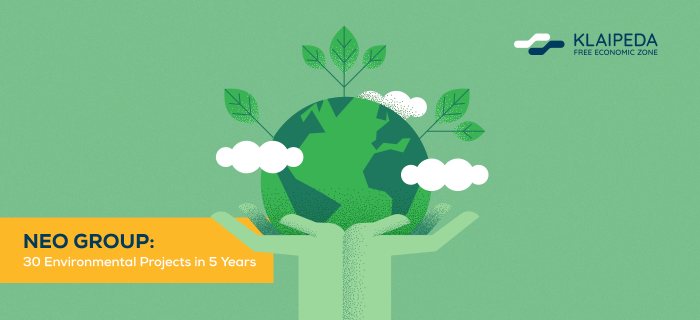News & Events
Watch our activity in one place
NEO Group: 30 Environmental Protection Projects in 5 Years

Lithuanian manufacturers invest in sustainability and no longer see these investments as expenses or requirements. Rather, they are aware of a footprint the industry can leave and proactively take measures to reduce it, Alfa.lt news website reports.
Established in 2004, NEO GROUP makes PET granules for food and beverage packaging and currently serves almost 300 clients from more than 30 countries all over the world. NEO GROUP expanded its activities in 2011 by introducing chemical PET waste recycling into Aromatic Polyester Polyol (NEOPOLYOL), which is widely utilized in the construction industry.
The PET granule manufacturing project, carried out in 2003-2006, remains the biggest greenfield investment project in Lithuania. In the planning stages of the manufacturing process, the most advanced technological solutions were chosen. Today, the NEO GROUP manufacturing process is one of the most efficient in the market, with the majority of it being automated and controlled by a small team of experienced engineers.
“Keeping in mind that our main export routes lead to the European Union countries, efficiency and sustainability are immutable pillars of our business,” says Rūta Žilienė, NEO GROUP’s HR & Communication Director. “We are constantly investing in and improving our technology.”
In the past five years, NEO GROUP invested more than 12 million EUR into projects to reduce energy costs and utilization of fossil fuels, as well as to create a safe work environment.
“Not all projects we carried out can be called investments,” says R. Žilienė. ”After all, we implemented some measures with no interest in recouping the costs. Our company culture requires us to constantly strive for perfection in our manufacturing, reduce our environmental impact and improve our processes. We consider this to be our main policy, a duty to our employees and a promise to both the environment and the people who live in the area.”
Throughout the last five years, the company carried out over 30 environmental and employee safety projects.
The biofuel boiler project we carried out in 2015 considerably reduced the carbon dioxide emissions of our manufacturing processes by replacing natural gas with biofuel, dialing down on our use of natural gas by 80%.
In 2011, NEO GROUP optimized its manufacturing processes by starting to utilize its PET waste. Currently, the company chemically recycles PET by-products into Aromatic Polyester Polyol (APP), which is used in the construction industry. In 2016, the company opened its second APP production line.
Several important projects were finished in 2017 as well. The factory started separating and burning the Volatile Organic Compounds (VOCs) out of its technological waste. This measure reduced VOC emissions into the environment, allowing NEO GROUP to boost productivity by 50% with only 4.7% growth of emissions after opening a third manufacturing line in 2018. The company also installed a gas scrubber, which allowed it to further reduced VOC emissions into the air.
“Following our duty towards the protection of the environment, we invested into updating our technology in 2018,” says R. Žilienė.”This allowed us to reduce our emission of compounds harmful to the ozone layer. Active ventilation in the transformer station allowed us to remove eight stationary air conditioning units, which use freon. In 2019, we continue to actively grow our utilization of renewable energy, starting with the planning for a solar power plant. We expect the project to be carried by the second quarter of 2020.”
NEO GROUP annually monitors emissions to the environment, sewage from stationary pollution sources, air pollution, greenhouse gas and underground water. The company also measures noise, ecogeology and waste ecotoxicity factors. The results of the company’s monitoring and lab testing efforts are declared to the relevant controlling authorities. According to R. Žilienė, the company spends 20 thousand EUR a year on monitoring alone.
Do investments into environmental protection pay off? “We put a great emphasis on the protection of the environment, doing everything we can to reduce our environmental impact,” says R. Žilienė. “Investing in energy efficiency is economically advantageous; however, there will always be some expenses with no chance of a pay off at the end, at least directly. For example, the company spent 65 thousand EUR this year to improve safety procedures and reduce health risks. The major goal of this expense was to create a comfortable work environment for our employees. Some of the projects were also started purely to reduce our environmental emissions as much as possible. These are not investments in the pure sense of the word because we do not expect a return. It is our everyday work, it is what we believe, it is our responsibility.”
